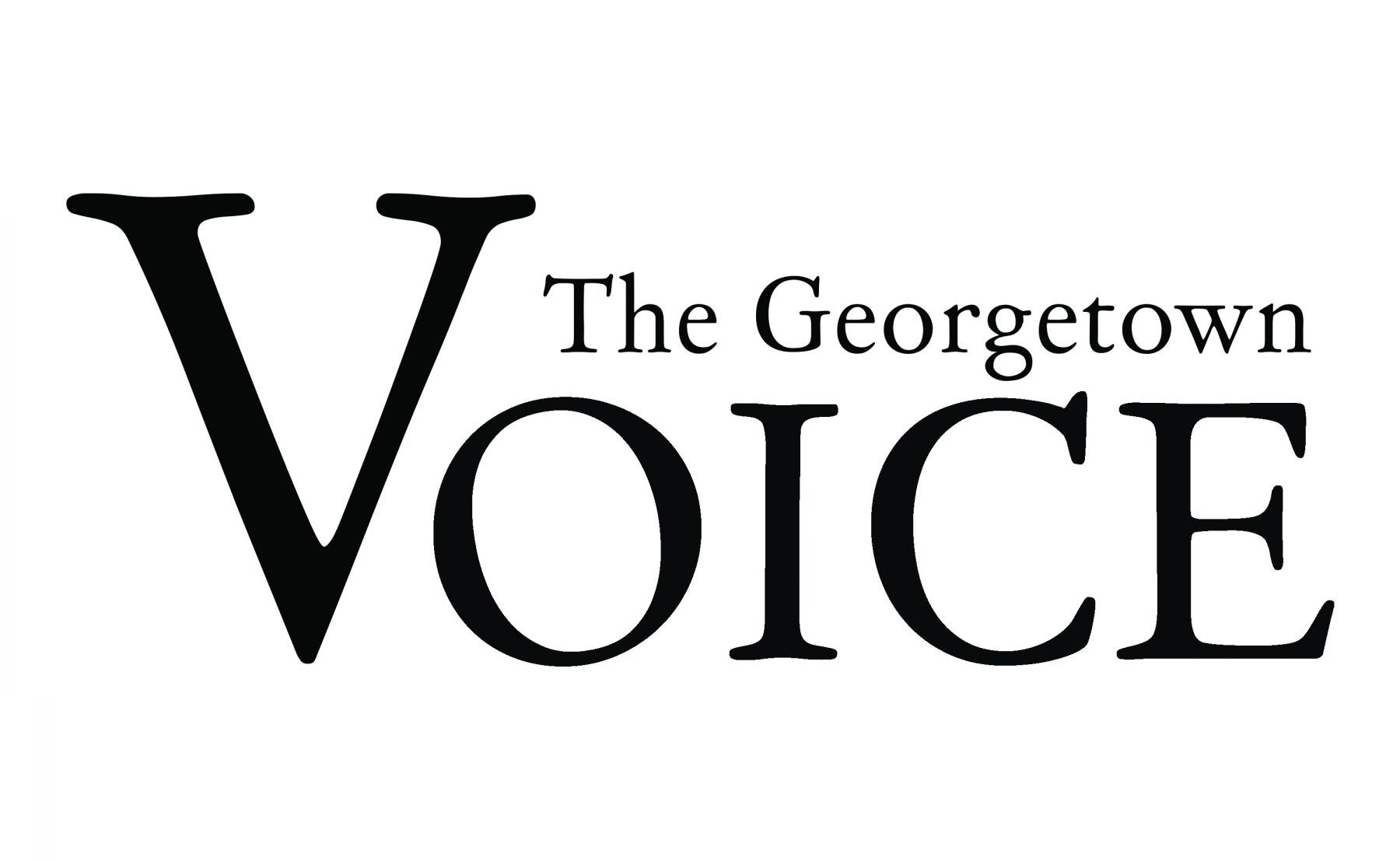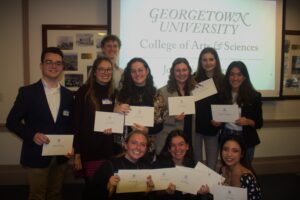For our last issue and last chance to work together, the graduating seniors at the Voice wanted to take a look at where various Voice alumni are now. From various graduating classes, we found not only journalists, but an attorney and even a professional clown. We hope you find their stories as interesting as we did.
CHASING THE PERFECT SHOT
When Mark McGwire closed in on Roger Maris’s single-season home run record during the summer of 1998, Darren Carroll (CAS ‘93) was there with his camera at every step, on assignment for Sports Illustrated.
“For each home run he hit, we had to write the number-58, 59, 60-on our film canisters so the office would know what was what. The record was 61. When McGwire hit number 62, my hands were shaking so badly that I dropped the film canister, not once, but twice. After I took it out of the camera, I couldn’t write the number ‘62’ on it. All I wound up with was a bunch of black squiggles where the number should be,” Carroll recalled. “So much for the ideal of journalistic objectivity.”
Carroll is a freelance photographer who works primarily for Sports Illustrated and Golf Digest, and also does work for Time and U.S. News and World Report. He got his start at the Voice, working as photo editor and basketball photographer. After graduating Georgetown with a degree in Government and Political Theory, he worked as an assistant to the team photographer for the Washington Capitols and the Hoyas that he met while taking photos for the Voice. He then went to the University of Texas where he earned a master’s degree in journalism, and while there worked as an assistant for Sports Illustrated. In 1997, he started shooting full time as a freelance photographer.
Focusing mostly on sports photography, particularly portraits and on-location shots, Carroll said his favorite athlete to photograph is golfer David Toms, and the worst is “anyone from the NBA.” Covering events from the Masters to the British Open and on to the National Rodeo Finals, Carroll spent 225 days on the road last year.
Carroll began working at the Voice during orientation his first year, and knew he was spending too much time at the Voice office after sleeping through his 2:30 classes. Aside from giving him his first experience of investigative journalism-by uncovering where a Stewards meeting was being held-the Voice prepared Carroll for the unpredictable nature of a career in journalism.
“Back when I was at the Voice, things changed on a day-to-day basis, sometimes hour-by-hour, and we all wrote off this lack of organization to the fact that we worked for a college paper, and the once we got into the ‘real world’ everything would become normal,” Carroll said. “Nothing could be further from the truth. Every shoot is an adventure.” -Gina Pace
MAKING THE NEWS
“We broke the story of Father Healy’s resignation as the University president,” said Craig Goldblatt (CAS ‘90), who served as news editor at the Voice his sophomore year and continued on to serve two terms as Editor-in-Chief. “We found a draft of the letter to the community announcing the resignation in a dumpster outside where it was printed and broke the news the day before the official announcement.”
Goldblatt, who has been an attorney specializing in bankruptcy and litigation at the D.C.-based law firm Wilmer, Cutler and Pickering since 1994, helped reestablish the news section of the Voice during his sophomore year at Georgetown. The first semester of his first year at Georgetown, Goldblatt began writing for The Hoya news section, covering GUSA. Soon after he began writing for The Hoya, the then-Editor-in-Chief of the Voice approached Goldblatt to help create a news section for the Voice. Goldblatt dedicated the rest of his journalism experience at Georgetown to the Voice.
“We had so much fun,” he said. “Some of my closest friends to this day are from the Voice.”
Besides breaking the news on Father Healy’s resignation as University president, Goldblatt helped the Voice break several more notable stories during his time as News Editor and Editor-in-Chief.
One of these stories involved a joint strike of the Voice and The Hoya against the University’s campus media advertising policy. In 1989, when the Supreme Court was hearing, Webster vs. Reproductive Health Services, a case concerning abortion practices, a women’s rights group approached the Hoya with an advertisement asking students to participate in a march on Washington. Then-Dean of Students and current University President John J. DeGioia forbade The Hoya to run the advertisement based on the University’s prohibition of pro-choice organization advertising.
“I got together with The Hoya editor-in-chief and we decided to stop printing both of our publications for two issues,” Goldblatt said. On the last issue that was published before the strike, a large red fist with the word ‘STRIKE!’ printed on the back page.
After graduating from Georgetown as an American Government major, Goldblatt decided to pursue law rather than journalism by attending the University of Chicago law school. “I’m probably a better personality type to be a lawyer than a journalist,” Goldblatt said, “Frankly, it takes more courage to be a journalist than to become a lawyer.”
Earlier this year, Goldblatt argued his first case before the Supreme Court as one of the attorneys representing the University of Michigan in defense of its affirmative action policy. Even in his current law practice, Goldblatt said that the skills he took from his Voice experiences were invaluable.
“You learn to write quickly, well and persuasively,” he said. “I can’t begin to measure how much I benefited from that.”
While he still remembers the time he spent in 413 Leavey fondly, Goldblatt said that his focus in life is much different now.
“[The Voice] was how I defined my existence, but you do have to, in life, move on,” he said. “I loved Georgetown, I loved being on the Voice … but 15 years later, it’s not the focus of my life.”
He continues, however, to receive an electronic copy of the Voice each week. -Debbie Hwang
THE GLOBETROTTER
Shaun Tandon (SFS ‘99) rose to become Editor-in-Chief of the Voice, but he was first tempted to join the Voice not by the prospects of a career in journalism, but rather by the benefits of being a Leisure writer-free CDs, books and concert tickets. But once he saw how seriously he and the other Voice staffers took their responsibilities, Tandon realized that he was headed for a life as a journalist.
Soon after graduation, Tandon began working for the French news agency Agence France-Presse. He first worked in Nicosia, Cyprus and was later moved to New Delhi. Since the start of the war with Iraq, Tandon has been in Dubai, editing news from Baghdad, but expects to move back to New Delhi once the war ends.
Tandon’s globetrotting as a foreign correspondent has made him put the importance of Georgetown campus issues into perspective.
“In my first year, we spent a total of 33 hours-not a timespan of 33 hours, but a full 33 hours-interviewing candidates for the GUSA presidency,” Tandon said. “An impressive performance by us, perhaps, but one I remember now more for its sheer excess.” -Lizzy Levin
THE EMBEDDED LIFE
As fans of Orwell and Greene can attest, the life of a foreign journalist can often be portrayed as dashing and romantic. But for Ben Arnoldy (CAS ‘98), an embedded journalist just wrapping up his tour of Iraq, the grit and difficulty of being a war correspondent quickly obscures whatever romance might exist.
“The weather sometimes makes it miserable to be outdoors. One time I had to make a satellite call in the middle of a sandstorm. My tear ducts were bulging with sand while the gusting winds knocked over my antennae,” Arnoldy said. “The problem was fixed with-you guessed it-a little duct tape to keep the antennae hitched to a chair.”
A daily web correspondent for the Christian Science Monitor, Arnoldy has been in Kuwait and southern Iraq for over a month with the 332nd Expeditionary Wing of the U.S. Air Force as part of the Pentagon’s program of “embedding” journalists. Far from the front lines but still within reach of missiles, he has written from a number of angles, including Air Force training, the early wake-up calls of attack pilots, the sandy weather of the Middle East and even “Gas Mask 101.” He says that his experience has been a trial by fire of sorts, especially for a man who only had a week to prepare before departing for the war.
“That was a frantic time procuring and learning about all the necessary equipment. I could open a Radio Shack with all the gadgets I have,” Arnoldy said.
“The Monitor had a flak vest with body armor. We purchased a kevlar helmet as well. I went out and bought a bunch of clothes for desert living, including a pair of ‘ventilated’ hiking sneakers that I can’t wait to throw away,” he said.
One of the most difficult parts of covering a war, Arnoldy said, is the distance from home. Without cell phone coverage, Arnoldy is forced to communicate with his wife through e-mail.
“Being separated from my wife for an undetermined amount of time has been difficult for both of us. And while I don’t spend a lot of time over here worrying, I think the dangers subtly contribute to my missing her,” Arnoldy said.
His journey to what many consider to be the heights of journalism was quicker than one would expect. After graduating from Georgetown in 1998, where he started the Voice’s website before online news was the force it is today, Arnoldy went to New Jersey for a year to teach at a boarding school. However, after spending much of his time absorbed by online news coverage, Arnoldy decided to take on his hobby for a living. With a bit of good luck, he found an opening at the Monitor’s website for a news producer and got the job. Arnoldy has been at the Monitor now for three-and-a-half years; last year, he won an Online News Association award for best online feature for a story he co-wrote about Amtrak. When the Pentagon allotted the Monitor two slots for the war earlier this year, Arnoldy pitched his “web dispatch” idea to the magazine and was awarded the position with the 332nd Expeditionary.
Arnoldy attributes much of his passion for journalism to his late nights spent at the Voice writing cover stories and managing the website, the first of its kind on campus.
A few years ago, Arnoldy dropped in on an old advisor at Georgetown. The advisor told him how his story about the lack of a South Asian Studies curriculum helped inspire just a program.
“That feeling of making a difference contributes to why I’ve stuck with this career,” he said. -Peter Hamby
STRAIGHT CLOWNIN’
Matthew Pauli (CAS ‘91) remembers “What Rocks” with great fondness. For about a year, he and a friend drew a comic strip by that name for the Voice, using Georgetown’s 200th anniversary to lampoon the university. One strip asserted that through the Jesuits’ association with Marriott, they fund Mormons.
Pauli has taken that frivolity and made it an essential part of his post-collegiate life. “I didn’t have real plans, as such, when I started school,” he says. “I was going by the whole liberal-arts notion that I would get educated as much as I could and figure it out later. I left myself wide open for anything.”
While Georgetown specializes in prescribing career paths for its students, Pauli took the road hardly ever taken: He applied and was accepted to Ringling Brothers Clown College.
“It was eight in the morning till ten at night, six days a week for two months of highly intensive circus training. We did everything that did not involve animals: juggling, unicycling, acrobatics, aerials and creating our own skits.”
Pauli claims Barnum and Bailey’s program is more competitive than Harvard Medical School.
“Jobs were offered to about 31 people, about one-third of the enrolled class,” he explains. “The day before selection, I walked into the director’s office and told him that I wasn’t sure I could live on a train for a year in a three-by-six-foot space.”
After Clown College, Pauli worked as a stage manager and a puppeteer for several years, traveling throughout Africa, Europe and the U.S. Presently, he is an actor and clown with the Big Apple Circus Clown Care Unit based out of Johns Hopkins University Hospital.
The draw to acting and the clown life is inexplicable to Pauli, although he advises imminent graduates to do that which they cannot live without.
“One of the things a lot of performers will say, including myself, is that they do their job because they have to-it’s that much of a pull. If you want to be a banker, or if you want to arrange flowers for a living, do it, do it well and hard. Eventually, everything will fall into place.” -Gilbert Cruz
COVERING THE BEAT
Nancy Trejos (CAS ‘98) adores The Washington Post, a fact you pick up on in the first few minutes of talking to her.
“I love the Post. It’s a wonderful place to work. There are so many great opportunities for young journalists here, and I’ve learned a lot from my editors and my colleagues,” she said.
Trejos now works for one of the nation’s top newspapers, a dream she had when she first came to Georgetown.
“I loved writing, I loved reading newspapers…and I thought Georgetown would be a great place because in the nation’s capital there would be a lot of opportunities for different things to write about,” she said.
Trejos joined the staff of the Voice almost immediately after arriving on campus. Over the four years of her involvement at the paper, she worked her way up through the ranks, from reporter to News Editor and Editor-in-Chief, but her first love always remained writing. She found the Voice’s cover story format especially amenable to her interest.
“The cover stories really lend themselves to good writing because you can write about so many things, what’s happening on campus and what’s happening in the city, where so much is already going on,” Trejos said.
Trejos wrote a number of in-depth cover stories, including one on a homeless shelter downtown where she spent a lot of time “trying to soak up the atmosphere and getting the details of the place so that I could write the hell out of the story.” She later submitted the piece as one of her clips to help her land a job after graduation.
After graduating from the College in 1998, Trejos interned at the Post for the summer, then moved to Los Angeles to write for the L.A. Times for about a year. She returned to Washington to rejoin the Post, where she has spent the last four years as Metro Section staff writer moving between a variety of posts in suburban Maryland.
Her current beat is the 135,000-student Prince George’s County, Maryland school system, one of the largest in the state. She spends a good deal of her time covering the politics of the system, which last year was mired in conflict between its school board and superintendent, but she also tries to give her readers a feel for life inside the schools. One of her favorite stories was a profile of Forestville Military Academy, Maryland’s first public military high school. Trejos’ article chronicled the story of one student, and followed his reaction to the new environment, as well as the reactions of his family, other students and the school’s teachers. The story ran on the Post’s front page last winter, and she received plenty of praise for her writing.
Trejos is excited but uncertain about what the future holds for her.
“I’m still early in my career, and I haven’t quite decided what I want to do beyond the near future. There are still some beats that I want to cover and lots that I want to learn,” she said. -Christopher Trott
STARTING IT ALL
Nearly all Voice alumni have benefited from the experience and wisdom of their predecessors. But not Stephen D. Pisinski-In 1969 he founded of The Georgetown Voice, and served as its first editor.
He brought to campus a publication whose editorial board would “view and analyze issues in a liberal light [and] not limit editorial content to campus topics,” while objectively reporting campus and community news and providing a forum for, yes, the voices of all students. Two years after founding the paper, Pisinski graduated magna cum laude from the College, receiving the H.B. Coakley Medal, the highest award in the University awarded to the senior who best demonstrates the qualities of Catholic leadership. After attending Georgetown, he received a master’s degree in public relations from Boston University and embarked on a remarkable career in that field. He started out working for Ketchum, MacLeod & Grove firm in Pittsburgh. Later, in San Francisco, Pisinski founded SDP Communications and later opened the San Francisco office of Burson-Marsteller. In 1992, he formed the Montgomery Group, where he was president until the time of his death. He was former chairman and CEO of the Public Relations Society of America. In addition, Pisinski served pro bono for the San Francisco School Volunteers, Swords to Plowshares and the Association for Retarded Citizens.
Sadly, Pisinski died at home last May at the age of 52 after suffering a heart attack. At the time, he was with his family in the San Francisco area where he lived for more than 20 years.
Among the other distinguished Voice alumni on this page, no other gave so much back to his campus as Pisinski. Thirty-five years later, his legacy still influences our community, whether those of us who work at his newspaper, or those who read it every Thursday. -Danielle DeCerbo






